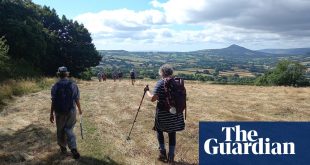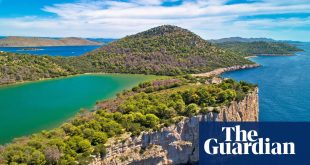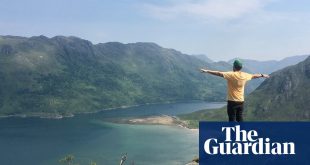The sky’s a hazy grey as the sun starts to rise, just visible behind the dense low-hanging cloud. We slide slowly – though not silently – into mirror-smooth Loch Ossian. Reflections of bare-branched trees ripple, a bird of prey hovers on the horizon. It doesn’t get much wilder than this; a full immersion into the elemental Highlands.
We’re staying at the Loch Ossian youth hostel at the water’s edge, one of the most remote in the UK. Off-grid, with no vehicle access and sleeping 20 in two bunkrooms, it’s a place to truly escape from the world. Old black-and-white photos of early female mountaineers hang on the walls; our damp hiking gear dries on racks by the fire; at night the pitch-black sky twinkles with countless stars.
I’m here with Wilderness Scotland on a trip to test “how low can you go?” when it comes to low-impact, low-carbon travel. On our three-day itinerary we’ll explore by foot, e-bike and electric vehicles, visiting rewilding projects and learning about the landscape and people working to protect it, too.
“This is how the future of travel could look: treading lightly and encouraging connection to the land,” says Wilderness Scotland’s Ben Thorburn, one of our guides for the weekend. “On a trip like this, your carbon impact could be less than if you stayed at home.”
Last year, in partnership with consultancy eCollective, the company undertook a complete carbon audit of more than 300 suppliers to calculate the carbon cost of every holiday offered. It’s a step towards their goal of becoming true net zero by 2030 and reducing carbon emissions by 90% in that time. As well as cutting emissions as much as possible, they buy reputable offset credits and plant trees to sequester more carbon and restore habitats. Customers can also opt into plant additional trees.
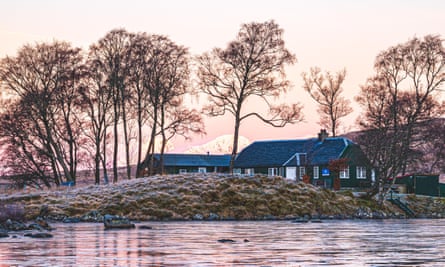
Our trip starts on the Caledonian Sleeper from London to Inverness (a fraction of emissions compared with flying). It’s still dark when I wake and peer out from my cabin, the landscape slowly coming into focus as we pull closer to the station.
An electric car awaits – the company is working to replace all vans with electric vehicles – and we glide across the Cairngorms national park to our first stop, Lynbreck Croft near Grantown-on-Spey. Lynn Cassells and Sandra Baer bought the 150-acre croft back in 2016 with little money, no plan and no farming experience, just a craving for a wilder life.
We tour the site, learning of the challenges and rewards of farming in symbiosis with nature – and the determination needed to succeed. Polytunnels brim with produce, Highland cattle and rare breed pigs roam and Lynn talks about the importance of soil health. As well as selling their produce, they run tours and workshops for those wanting to learn more about smallholdings and regenerative farming. We picnic in the autumn sunshine with views of the Cairngorms on the horizon, not wanting to leave.
Visits to local sustainable businesses feature on many Wilderness itineraries and that evening – after a hike along the Speyside Way from Boat of Garten to Aviemore – we head to Inshriach estate and distillery, where Walter Micklethwait makes small-batch craft gin using wild juniper berries and locally picked ingredients. Hidden in the woods, the bar combines a wild west saloon with speakeasy vibe; the cocktails and magical setting make for a fun evening before we return to Aviemore for dinner and our B&B.
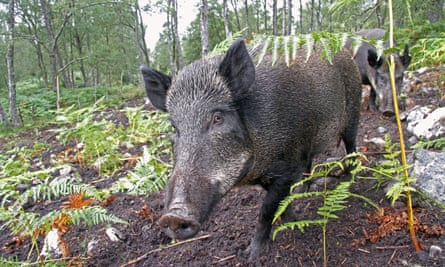
Loch Ossian, on the Corrour estate, can only be reached on foot or by bike so the next morning our e-bikes are delivered to the roadside near Moy Lodge and we saddle up to cycle the 15 miles to the hostel. They make easy work of climbs through woodlands and open tracks across Rannoch Moor. The autumnal palette of rust and gold, splashed with waterfalls and gushing rivers, stands out against a steely sky. On the top of the hillside a red stag appears, perfectly silhouetted, and grouse fly up from the grass. It begins to rain heavily, but nothing can dull the glory of the landscape.
after newsletter promotion
We arrive at the hostel dripping but happy – and before bed there’s one last foray in the dark to the Corrour Station House Restaurant, where the venison comes from the estate. This is the highest railway station in the UK and the next day we board the West Highland Line (recently equipped with a dedicated bike carriage) for the picturesque ride to Spean Bridge.
One of Wilderness Scotland’s partners is Trees for Life, which is working to rewild the Highlands and restore the Caledonian Forest. Before our train back home we visit the flagship Dundreggan estate – where the UK’s first rewilding centre will open in March. We tour the tree nurseries and walk through the beech forests, learning where natural regeneration works and where reforestation is needed.
It’s an interesting end to a whirlwind long weekend that has shown how travel can educate, excite and be fun, with minimal impact on the planet. Carbon emissions for a trip such as ours would be around 38kg a person for three days (including everything from accommodation to food, but not the train up), says Ben, when the average CO2 a person a day in the UK is 15kg. Not all itineraries can have such a light footprint, of course, but it’s an inspiring step in the right direction.
The trip was provided by Wilderness Scotland, which offers a range of low-carbon guided and self-guided holidays athat incorporate sustainable accommodation and experiences. Prices on the Caledonian Sleeper from London Euston to Inverness or Aviemore start from £55 for a seat, classic rooms from £205 for two, Club rooms from £255 for two
 Top Naija News: Nigerian News, Breaking News Nigeria and World News Top Naija News is a daily news publication in Nigeria, delivering the latest breaking news in Nigeria and around the world.
Top Naija News: Nigerian News, Breaking News Nigeria and World News Top Naija News is a daily news publication in Nigeria, delivering the latest breaking news in Nigeria and around the world.
